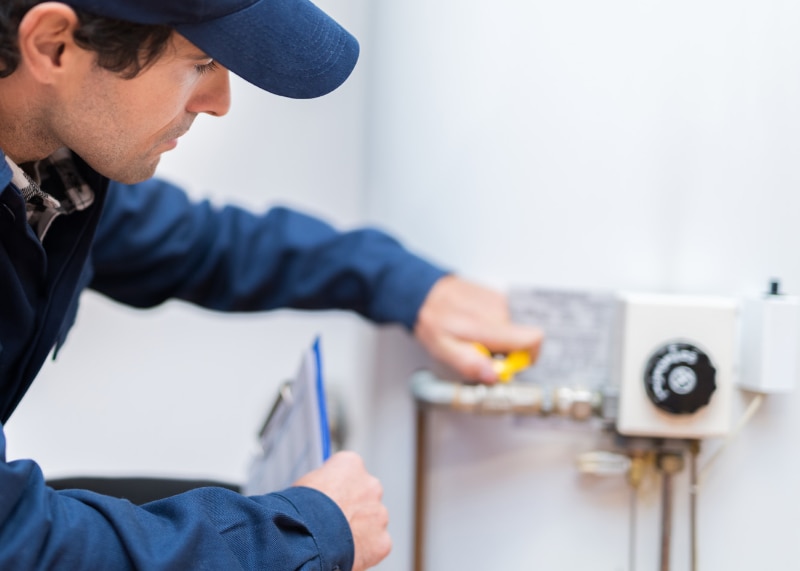General Water Heater Complications Explained
General Water Heater Complications Explained
Blog Article
We've noticed this great article pertaining to Water Heaters Problems directly below on the net and decided it made sense to share it with you on this page.

Think of starting your day without your routine hot shower. That currently establishes an inadequate tone for the rest of your day.
Every home requires a trustworthy water heater, yet just a couple of know how to handle one. One easy way to keep your water heater in top form is to look for mistakes consistently and fix them as quickly as they appear.
Keep in mind to shut off your hot water heater prior to sniffing around for faults. These are the hot water heater faults you are more than likely to run into.
Water also hot or too chilly
Every hot water heater has a thermostat that identifies exactly how warm the water gets. If the water coming into your home is too hot in spite of establishing a practical optimum temperature, your thermostat might be faulty.
On the other hand, too cold water might be due to a fallen short thermostat, a busted circuit, or incorrect gas circulation. As an example, if you use a gas hot water heater with a damaged pilot burner, you would get cold water, even if the thermostat is in ideal condition. For electrical heating units, a blown fuse may be the culprit.
Not nearly enough hot water
Hot water heater come in many dimensions, relying on your hot water demands. If you lack hot water prior to everyone has actually had a bath, your water heater is as well tiny for your family size. You need to take into consideration setting up a bigger water heater container or choosing a tankless water heater, which uses up much less space as well as is a lot more long lasting.
Weird sounds
There are at least 5 sort of noises you can hear from a water heater, however the most typical analysis is that it's time for the hot water heater to retire.
To start with, you need to recognize with the typical sounds a hot water heater makes. An electrical heating unit might sound different from a gas-powered one.
Standing out or banging noises generally suggest there is a piece of sediment in your storage tanks, and it's time to cleanse it out. On the other hand, whistling or hissing sounds may just be your valves allowing some stress off.
Water leakages
Leakages could come from pipelines, water links, shutoffs, or in the worst-case circumstance, the storage tank itself. In time, water will certainly corrode the storage tank, and locate its way out. If this happens, you need to replace your water heater as soon as possible.
Nevertheless, prior to your modification your entire storage tank, be sure that all pipes are in area which each shutoff functions perfectly. If you still require assistance determining a leakage, call your plumber.
Rust-colored water
Rust-colored water indicates one of your water heater components is worn away. Maybe the anode pole, or the storage tank itself. Your plumber will certainly have the ability to identify which it is.
Lukewarm water
No matter just how high you established the thermostat, you will not get any warm water out of a heater well past its prime. A hot water heater's performance may minimize with time.
You will also get lukewarm water if your pipes have a cross connection. This means that when you switch on a tap, warm water from the heater streams in together with routine, cold water. A cross link is simple to place. If your hot water faucets still follow closing the water heater shutoffs, you have a cross link.
Discoloured Water
Corrosion is a significant cause of dirty or discoloured water. Deterioration within the water tank or a stopping working anode rod can trigger this discolouration. The anode pole shields the storage tank from rusting on the within and also must be inspected yearly. Without a pole or a correctly functioning anode pole, the warm water promptly rusts inside the tank. Contact an expert hot water heater service technician to figure out if replacing the anode pole will certainly fix the issue; otherwise, change your hot water heater.
Final thought
Preferably, your water heater can last 10 years prior to you require an adjustment. Nevertheless, after the 10-year mark, you may experience any one of these faults extra routinely. At this point, you should add a new hot water heater to your budget plan.
How To Troubleshoot 3 Common Water Heater Problems in Twin Cities
The Water Heater Is Leaking
A leaky cold water inlet valve A loose pipe fitting A leaky temperature and pressure relief valve A corroded anode rod A cracked tank Turn Off Your Water Heater:
Shut off your gas water heater by turning the gas valve on the unit to the “OFF” position. Shut off your electric water by switching its power off at your electrical panel. Look for a two-pole breaker labeled “water heater” and turn it to the “OFF” position. Move the ball valve connected to the water heater to be perpendicular to the piping at a 90° angle. Look for the Leak:
Depending on whether the water is coming from the tank's top or bottom, you’ll want to look for the leak in different locations.
If the leak comes from the top of the tank, carefully look for water escaping from the cold water inlet valve or loose pipe fittings. Rusted hot and cold water valves can have loose connections with the tank, with water leaking out of them.
https://mspplumbingheatingair.com/blog/how-to-troubleshoot-3-common-water-heater-problems
As a person who reads on Water Heaters Problems, I was thinking sharing that excerpt was really useful. Those who enjoyed our blog posting plz do not forget to share it. Thanks a bunch for your time. Please come by our website back soon.
Efficient help? Call! Report this page